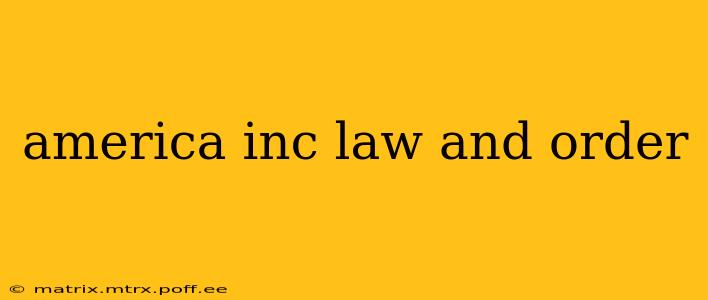America Inc., a term often used to represent the power and influence of large corporations in the United States, operates within a complex legal and regulatory framework. Understanding the interplay between corporate power and the rule of law is crucial to comprehending the American economic and political landscape. This article delves into the intricacies of law and order as they relate to American corporations, exploring the challenges, successes, and ongoing debates surrounding corporate accountability.
What Laws Govern American Corporations?
American corporations are subject to a vast array of federal and state laws, encompassing everything from corporate formation and governance to environmental protection and antitrust regulations. Key federal laws include the Securities Exchange Act of 1934, which regulates the stock market and protects investors; the Sherman Antitrust Act, which prevents monopolies and promotes competition; and the Sarbanes-Oxley Act of 2002, enacted in response to major corporate scandals, which strengthens corporate financial disclosures and accountability. State laws vary, but generally address matters such as corporate charters, corporate taxes, and business licensing. The sheer volume and complexity of these regulations often necessitates specialized legal expertise for large corporations.
How Effective are Regulations in Preventing Corporate Crime?
The effectiveness of regulations in preventing corporate crime is a subject of ongoing debate. While laws exist to deter and punish wrongdoing, enforcement can be challenging and resource-intensive. Furthermore, the sheer size and complexity of some corporations can make it difficult to uncover and prosecute illegal activities. Whistleblower protections are crucial in encouraging the reporting of corporate misconduct, but even with these safeguards, fear of retaliation can deter individuals from coming forward. The effectiveness of regulatory bodies like the Securities and Exchange Commission (SEC) and the Department of Justice (DOJ) in investigating and prosecuting corporate crime is also subject to scrutiny, with calls for increased resources and stronger enforcement actions.
What are the Consequences for Corporate Misconduct?
The consequences of corporate misconduct can be severe, ranging from hefty fines and penalties to criminal indictments and reputational damage. Companies found guilty of violating laws can face significant financial losses, impacting their stock prices and investor confidence. Individual executives and employees can also face criminal charges and imprisonment. Beyond the legal ramifications, corporate misconduct can severely damage a company's reputation, leading to boycotts, loss of customers, and difficulty attracting and retaining talent. The long-term consequences can be far-reaching and profoundly affect the company's sustainability.
How is Corporate Social Responsibility (CSR) Related to Law and Order?
Corporate Social Responsibility (CSR) initiatives, while not legally mandated in many cases, are increasingly viewed as a crucial aspect of corporate governance. Companies are facing growing pressure from stakeholders – including investors, employees, customers, and communities – to act ethically and sustainably. While CSR is not a substitute for legal compliance, many corporations see it as a way to build trust, enhance their reputation, and mitigate risks associated with misconduct. Strong CSR practices can demonstrate a commitment to ethical behavior and responsible business practices, reducing the likelihood of legal issues and enhancing long-term sustainability.
Can Corporations Be Held Accountable for the Actions of Their Employees?
Corporations can be held accountable for the actions of their employees, particularly if those actions were committed within the scope of their employment and furthered the company's interests. The concept of respondeat superior, meaning "let the master answer," holds employers vicariously liable for the torts committed by their employees. This principle applies even if the employer was unaware of the employee's actions. However, proving this liability requires demonstrating a clear connection between the employee's actions and the corporation's business operations. The specific legal requirements vary depending on the jurisdiction and the nature of the misconduct.
What Role Does the Media Play in Holding Corporations Accountable?
Investigative journalism plays a vital role in holding corporations accountable. Media outlets often uncover corporate wrongdoing that might otherwise go undetected, bringing important issues to public attention and prompting regulatory investigations. While the media can face legal challenges in pursuing such investigations, their role in exposing corporate misconduct is often crucial in driving change and fostering greater transparency and accountability. The power of public opinion, shaped in part by media coverage, can significantly influence corporate behavior and regulatory responses.
In conclusion, the relationship between America Inc. and the rule of law is a complex and dynamic one. While regulations exist to ensure corporate accountability, effective enforcement and proactive ethical practices are crucial in preventing corporate misconduct and fostering a more just and equitable economic system. The ongoing dialogue surrounding corporate responsibility, media scrutiny, and the effectiveness of regulatory bodies will continue to shape the future of law and order in the corporate world.
